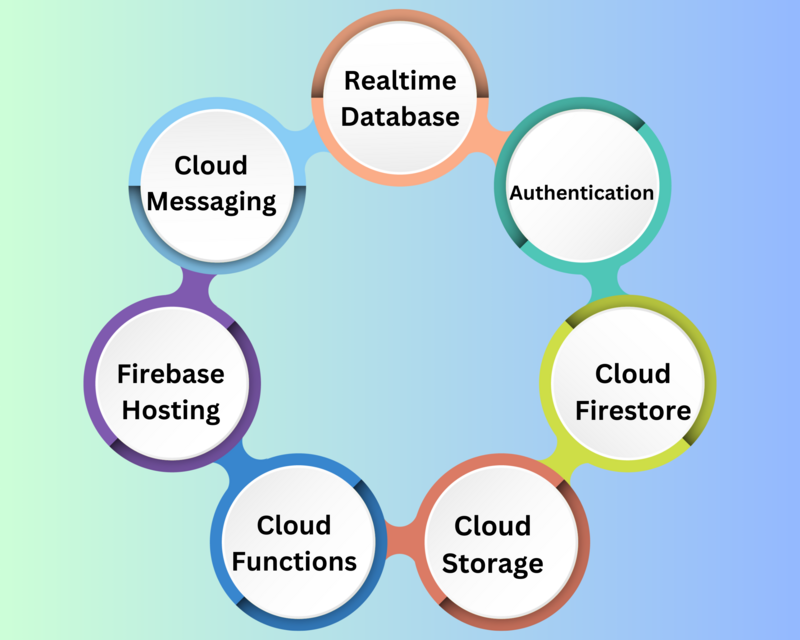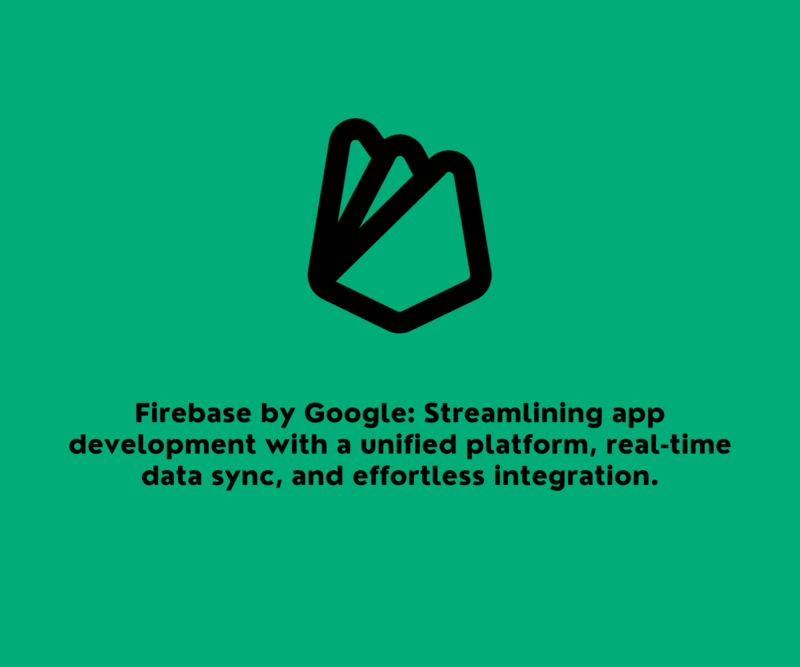What is Firebase and How It Works?
Firebase is a comprehensive mobile and web application development platform provided by Google. It offers a wide range of tools and services that simplify the development process and provide powerful functionality for building feature-rich applications. Firebase combines multiple backend services, such as a real-time database, cloud storage, authentication, and hosting, into one integrated platform.
At its core, Firebase is built around the concept of a NoSQL database, which allows developers to store and retrieve data in a flexible and scalable manner. Firebase also leverages real-time data synchronization, enabling instant updates across connected devices without the need for manual refreshing.
Firebase works by providing developers with a set of client libraries and SDKs for various platforms, including Android, iOS, and web. These libraries abstract the complexity of backend infrastructure and provide a straightforward interface for interacting with Firebase services. Developers can seamlessly integrate Firebase into their applications and leverage its powerful features to enhance functionality and user experience
What Type of Apps Can Be Developed with Firebase?
Firebase is a versatile platform that can be used to develop a wide range of mobile and web applications. It is particularly well-suited for applications that require real-time data synchronization, user authentication, and cloud storage. Here are a few examples of the types of apps that can be built with Firebase:
Real-time collaboration apps: Firebase's real-time database and synchronization capabilities make it ideal for building collaborative apps such as chat applications, shared to-do lists, and collaborative document editors.
Social networking apps: Firebase provides robust user authentication, enabling the development of social networking apps that require user registration, login, and social sign-in options.
E-commerce apps: With Firebase, developers can build e-commerce applications that handle product catalogs, shopping carts, and user transactions securely.
On-demand apps: Firebase can power on-demand apps such as ride-sharing platforms, food delivery services, and appointment booking systems by handling real-time location updates, user authentication, and database management.
Content sharing apps: Firebase's cloud storage feature enables developers to create apps that allow users to upload, store, and share various types of media content, including images, videos, and documents.
What are Firebase Core Features?
Firebase offers a wide range of core features that form the foundation of its development platform. These features include:

Realtime Database:
Firebase's NoSQL database enables developers to store and sync data in real time across connected devices.
Authentication:
Firebase Authentication provides a secure and easy-to-use solution for user authentication, supporting various authentication providers such as email/password, Google, Facebook, and more.
Cloud Firestore:
Firestore is a scalable and flexible NoSQL document database that allows developers to store, query, and sync data for their applications.
Cloud Storage:
Firebase Cloud Storage enables secure and efficient storage of user-generated content such as images, videos, and documents.
Cloud Functions:
Firebase Cloud Functions allows developers to extend their applications with serverless functions that run in response to events.
Firebase Hosting:
Firebase Hosting offers a reliable and scalable solution for hosting web applications and static content, with built-in SSL encryption and content delivery network (CDN) integration.
Cloud Messaging:
Firebase Cloud Messaging provides a reliable and efficient way to send notifications and messages to users across different platforms.
What are Firebase Use Cases?
Firebase can be applied to various use cases across different industries and application domains. Here are some examples of how Firebase can be used:
Real-time collaboration:
Firebase's real-time database and synchronization capabilities make it ideal for building collaborative applications, such as team project management tools or multiplayer games.
Social media and community platforms:
Firebase's authentication and real-time data synchronization features are well-suited for creating social networking apps, community forums, and content sharing platforms.
On-demand services:
Firebase can power on-demand services such as taxi booking apps, food delivery platforms, and home service marketplaces by handling real-time location updates, user authentication, and data management.
E-commerce and retail:
Firebase can be used to develop e-commerce applications that handle product listings, shopping carts, and secure transactions
Media and content sharing:
Firebase's cloud storage feature enables the development of media-intensive applications, such as photo-sharing platforms, video streaming services, and document collaboration tools.
Firebase Advantages
Firebase offers several advantages that make it a popular choice among developers:
Rapid development:
Firebase provides a set of pre-built tools and services, allowing developers to focus on building their app's core functionality without spending excessive time on backend infrastructure.
Real-time data synchronization:
Firebase's real-time database and synchronization capabilities enable instant updates across connected devices, creating a seamless and interactive user experience.
Scalability:
Firebase's cloud-based infrastructure ensures that applications can scale effortlessly to accommodate increasing user demands.
Seamless integration:
Firebase provides client libraries and SDKs for various platforms, making it easy to integrate and use Firebase services in applications developed for different platforms.
Secure and reliable:
Firebase offers built-in security features, such as user authentication and database security rules, to protect user data and ensure a secure environment for app development.
Analytics and insights:
Firebase Analytics provides powerful insights into user behavior, allowing developers to make data-driven decisions and optimize their apps for better engagement and performance.
Getting Started with Firebase
Create a Firebase account and project.
The first step to getting started with Firebase is to create an account. Simply go to the Firebase website and sign up using your Google account. Once you have created an account, you can create a new project by clicking on the "Create Project" button. Give your project a name and select your preferred region. You can also choose to enable Google Analytics for your project.
Once you have created your account and project, you can start exploring Firebase's features and integrating them into your application. Whether you are building a simple website or a complex mobile app, Firebase has everything you need to create a great user experience. So, don't wait any longer, create your Firebase account and project today and start building amazing applications!
Set up Firebase Authentication.
Firebase Authentication is a powerful tool that allows you to easily add user authentication to your application. To set up Firebase Authentication, go to the Firebase console and select your project. Then, click on the "Authentication" tab and select the "Set up sign-in method" button. From there, you can choose which sign-in methods you want to enable, such as email and password, Google, Facebook, or Twitter. Once you have enabled your desired sign-in methods, you can start integrating Firebase Authentication into your application.
Firebase Authentication provides a secure and easy way to manage user authentication in your application. By enabling sign-in methods like email and password, Google, Facebook, or Twitter, you can allow users to sign in with their preferred method. Firebase Authentication also provides features like two-factor authentication and account linking to enhance security. To integrate Firebase Authentication into your application, you can use the Firebase Authentication SDKs for various platforms, including web, iOS, and Android. With Firebase Authentication, you can focus on building your application while leaving the authentication to Firebase.
Add Firebase Realtime Database to your project.
Firebase Realtime Database is a cloud-hosted database that allows you to store and sync data in real-time. To add Firebase Realtime Database to your project, go to the Firebase console and select your project. Then, click on the "Database" tab and select the "Create Database" button. From there, you can choose to start in test mode or in locked mode. Test mode allows anyone to read and write to your database, while locked mode requires authentication to access your database. Once you have set up your database, you can start integrating it into your application.
To integrate Firebase Realtime Database into your application, you will need to add the Firebase SDK to your project. This can be done by adding the Firebase dependencies to your app's build.gradle file. Once you have added the dependencies, you can initialize the Firebase Realtime Database in your application code. This will allow you to read and write data to your database in real-time. You can also set up listeners to receive updates when data in your database changes. With Firebase Realtime Database, you can easily create real-time applications that can scale to meet the needs of your users.
Use Firebase Cloud Functions to automate tasks.
Firebase Cloud Functions allow you to run server-side code in response to events triggered by Firebase features and HTTPS requests. This can be incredibly useful for automating tasks such as sending notifications, processing payments, and updating data. To get started with Firebase Cloud Functions, you'll need to have a basic understanding of JavaScript and Node.js. Once you're familiar with those, you can create and deploy your functions using the Firebase CLI. With Firebase Cloud Functions, you can streamline your development process and focus on building great user experiences.
One of the most powerful features of Firebase Cloud Functions is the ability to automate tasks. For example, you can use Cloud Functions to send push notifications to users when certain events occur in your app, such as when they receive a new message or when their order has been shipped. You can also use Cloud Functions to process payments, such as charging a user's credit card when they make a purchase. Additionally, you can use Cloud Functions to update data in your database, such as calculating a user's total score in a game. By automating these tasks, you can save time and ensure that your app is always running smoothly. So if you're looking to streamline your development process and build great user experiences, consider using Firebase Cloud Functions.
Integrate Firebase Hosting to deploy your app.
Firebase Hosting is a powerful tool that allows you to deploy your web app quickly and easily. With Firebase Hosting, you can host your static assets, such as HTML, CSS, and JavaScript files, and serve them to your users with lightning-fast speed. To get started with Firebase Hosting, you'll need to have a Firebase project set up and your app code ready to deploy. Once you've done that, you can use the Firebase CLI to deploy your app to Firebase Hosting with just a few simple commands. With Firebase Hosting, you can ensure that your app is always available to your users, no matter where they are in the world.
One of the great things about Firebase Hosting is that it automatically handles SSL certificates for your domain, so you don't have to worry about setting that up yourself. Additionally, Firebase Hosting offers features like URL redirects and custom headers, giving you more control over how your app is served to your users. And with Firebase's global CDN, your app will load quickly for users all over the world. So if you're looking for a fast and easy way to deploy your web app, consider integrating Firebase Hosting into your workflow.

Conclusion:
In conclusion, Firebase is a powerful development platform that offers a comprehensive set of tools and services to simplify app development and enhance user experience. Whether you're building a real-time collaboration app, a social networking platform, or an e-commerce application, Firebase provides the necessary features and functionality to bring your ideas to life.
Newsletter to recieve
our latest company updates
Comment